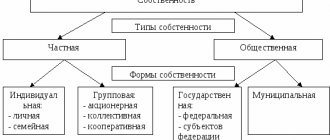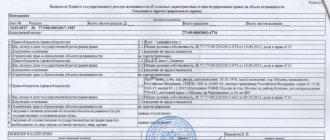Every person has the right to have private property, dispose of it at his own discretion, and share it with loved ones - such guarantees are given by the Constitution of the Russian Federation to its citizens.
Dear readers! Our articles talk about typical ways to resolve legal issues, but each case is unique. If you want to find out how to solve your particular problem, please use the online consultant form on the right or call. It's fast and free!
What does private ownership of land mean?
Private property is the status of a land plot, thanks to which the owner has maximum opportunities and powers to manage it.
Changes in the provisions of land legislation sanctioned by the state allowed the possibility of registering land as the property of private individuals.
These changes are based on the normative acts of the Constitution of the Russian Federation - Articles 35 and 46.
Article 35
1. The right of private property is protected by law. 2. Everyone has the right to own property, own, use and dispose of it, both individually and jointly with other persons. 3. No one can be deprived of his property except by a court decision. Forced alienation of property for state needs can only be carried out subject to prior and equivalent compensation. 4. The right of inheritance is guaranteed.
Article 46
1. Everyone is guaranteed judicial protection of his rights and freedoms. 2. Decisions and actions (or inaction) of state authorities, local governments, public associations and officials may be appealed to the court. 3. Everyone has the right, in accordance with international treaties of the Russian Federation, to apply to interstate bodies for the protection of human rights and freedoms if all available domestic remedies have been exhausted.
At the same time, land acts as an unusual property of one’s own, in connection with which the Civil Code of the Russian Federation enshrines the following provisions, according to which ownership and disposal of it is permissible if it does not cause damage to the environment and does not violate people’s rights.
To be able to own a plot, it is necessary to draw up title documents, and the use of land is available on the basis of many regulations, in accordance with urban planning and construction regulations.
You can find out what the public form of ownership of a land plot is by following the link.
Important: obtaining the right to own land does not mean obtaining ownership of it.
You can see how the right of private ownership of a land plot is regulated at the legislative level in this video:
On what basis do powers arise and terminate?
To obtain the status of a copyright holder, one of the following events must occur:
- Transfer of this title based on inheritance.
In this case, ownership rights are transferred along the hereditary line from the predecessor as a result of the inheritance procedure or as a result of drawing up an agreement and its subsequent registration in Rosreestr.
Also included in this category is a purchase and sale transaction, which also results in the alienation of land on the basis of the rights that have arisen.
- Transfer of ownership based on other events that have occurred.
This category includes cooperation between the title applicant and local authorities, who provide the opportunity for free privatization of land or the right to purchase.
This is possible as a result of:
- Rent of a plot;
- Inheritance;
- Indefinite use.
Moreover, if the new owner is an unscrupulous user of the land, local authorities have the right to take actions to seize the site and deprive the violator of property rights.
Important: the right of ownership relates to a non-terminating type of right - when it ends with one user, it arises with another, with the exception of areas that have been destroyed.
As a result, termination of land ownership means the transfer of the property to another owner.
Economic importance of private land ownership.
Objects and subjects of private land ownership
Important: objects are territories of land transferred into private ownership by those who have the right or have acquired the right to land.
Such objects are excluded from federal or general significance and relate to certain categories:
- Agricultural land;
- allocated for settlements;
- Under an industrial area.
A similar right cannot be applied to other categories.
Important: individuals and legal entities have the right to act as subjects
Based on available documents, they interact with local authorities to obtain the right or, on the basis of inheritance, acquire this title.
In this case, ownership is registered in the name of a specific person or organization.
Subjects are divided into the following categories;
- Shared ownership;
- Individual owners;
- Common ownership;
- Non-profit and commercial organizations.
All these categories are listed in the register of land owners.
Contents of ownership of land plots.
Powers
Rights are the right of every owner of land to exploit it profitably. According to the law, every land owner has the right, observing legislative acts on subsoil and airspace, to use everything that is under and above the land that rightfully belongs to him.
He has the right:
- Erect buildings;
- Demolition of dilapidated housing;
- Allow similar actions on your land to other persons.
At the same time, he is obliged to act in accordance with regulations that give him the right to do so and oblige him to comply with the regulations.
This means that land can be used only within the limits of its purpose and belonging to one or another category.
To gain access to exploitation of land in a different direction, it is necessary to change its category. Such actions are carried out in accordance with Article 8 of the Land Code of the Russian Federation.
At the same time, you can choose the type of permitted use at your discretion within the zoning limits of the territories. Is it possible and how to change the type of permitted use of land? Read here.
Thus, the powers allow the use of land according to needs in compliance with all norms and legal requirements.
Legislative regulation
Ownership of land is determined in accordance with Chapter III of the Land Code of the Russian Federation. So in paragraph 1 of Art. 16 of the Land Code of the Russian Federation states that all plots owned by citizens, enterprises or municipalities are state plots.
State ownership of territory is divided into three categories:
- federally owned;
- belonging to the constituent entities of the Russian Federation;
- related to the property of municipalities.
Until the early 90s, all land plots belonged to the state. They were provided to the population for temporary use, but ownership remained with the authorities. And only with the beginning of privatization, private landholdings began to appear, the owners of which were citizens or organizations.
What territories are available to have as private property?
Important: territories acquired by legal entities and individuals through legal actions are used as private property.
At the same time, there are no differences in the rank of a person - everyone has equal rights to own land, and there are also no differences in the legal regime of land; their application is absolutely identical for everyone.
Foreigners of any category also have access to owning land as private property.
At the same time, lands withdrawn from circulation or limited in circulation cannot become anyone’s property. This is only possible if the purpose of the land changes. Citizens have the right to use all other lands on the basis of private property, individually or jointly.
What documents confirm ownership
Legal documents include:
- Certificate of state registration of property rights;
- An extract from the state real estate cadastre in the form KV-1 and KV-6 containing the exact parameters of the site;
- Resolution on the allocation of land.
Important: along with these documents, agreements are registered that do not give the right to private property, but documents are issued indicating the type of ownership of the site.
How to register land ownership and obtain all the necessary documents? Step-by-step instructions are contained in this article.
Legislative regulation of private property rights.
How does the alienation of a plot with this status occur?
Important: alienation is the transfer of land from one owner to another, if there is no talk of transfer, such a procedure cannot be called alienation.
The rules and possibility of this action are provided for by current legislation in accordance with which alienation can be:
- Voluntary, involving the transfer of rights in accordance with civil law transactions;
- Forced – transfer of rights to land to another person without taking into account the opinion of the real owner, for example, confiscation.
In this case, the actions occur in the following order:
- An agreement is concluded as the basis for the transfer of rights;
- Registration of rights is carried out as a mandatory procedure.
In this case, it is important to have the owner’s written consent to these measures with a detailed description of the terms of the transaction and the characteristics of the object.
Important: there is a list of lands for which alienation is prohibited by law, for example, protected areas.
Lands located, for example, in a gardening partnership are alienated somewhat differently - a certificate from the head of the company is required to confirm that there is no debt.
Objects located on this land can be alienated without territory:
- Upon alienation of a share of residential space;
- When alienating a building located on a territory withdrawn from circulation.
Important: it will not be possible to alienate part of the land with the transfer of ownership without separating it into a separate object through a cadastral valuation.
Which areas are considered public property?
Territories that do not have an owner in the person of legal entities or individuals, and also meet the following requirements, are recognized as state territories:
- having established boundaries;
- who have a specific address or location;
- put on cadastral registration.
In addition, there are lands that can only be publicly owned:
- forest and water resources;
- specially protected areas;
- areas intended for defense needs and the needs of the country's security services;
- territories with subsoil of federal significance;
- reserve lands;
- areas where public infrastructure facilities are located, for example, a highway.
The list of lands that can only be considered state property is open. Federal and regional authorities have the right to independently determine the criteria by which land cannot be transferred to citizens.
Ways to protect the rights of private owners
To prevent rights from being violated, it is necessary to:
- Check your cadastral documentation accurately - any error in the documents leads to the possibility of violation of the owner’s rights by other persons, for example, neighbors.
- To be a bona fide owner, in this case, this category includes persons who could not know that the person who transferred the land to them did not have title documents.
- If the owner acquired the land in good faith and honestly fulfilled his duties, then the plot can be confiscated from him only in the following 2 cases:
- If the property was received free of charge;
- If the land was taken from the previous owner illegally.
In this case, the owner has the right to receive compensation from the illegal owner in full for the period of his exploitation of the land.
In the case of a bona fide purchaser of land, he also has the right to compensation for the costs incurred to improve the land from the moment of use of it.
Citizens' obligations
The obligatory rights of persons to a plot of land are realized only in the process of concluding an agreement or transaction for the use of a specific land plot.
The rights to use the land plot, in this case, are established by legal documents that bilaterally fix the powers of the parties. If a tenant wants to establish a woodworking shop on a plot of land, and the land plot is not intended for such operations, the transaction will be considered illegal. Considering the above, the legal relations of citizens, who may differ in connection with the existing rights to a given plot of land, can be divided into commercial and non-commercial. But such a division is conditional, so all participants will bear responsibility for illegal operations with and on land.
In contact with
Right of lifelong inheritable ownership
The current federal legislation does not disclose the content of the right of lifelong inheritable ownership. To a certain extent, it is detailed only in Chap. 17 Civil Code of the Russian Federation. Based on Art. 266, 267 of the Civil Code of the Russian Federation, a citizen who has the right of lifelong inheritable ownership of a land plot has the rights of ownership and use of a land plot, transmitted by inheritance. The owner of a land plot has the right to erect buildings and structures on it and create other real estate by acquiring ownership rights to it.
The disposal of a land plot owned by a citizen on the right of lifelong inheritable ownership was significantly limited. He could transfer the land plot only for rent and free-term use, and now only by inheritance. The sale, pledge of a land plot and other transactions by its owner that entail or may entail the alienation of the land plot are not permitted. Just like the owners of a land plot, plot owners are required to pay land tax.
Unless otherwise follows from the conditions for use of a land plot established by law, the owner of a land plot has the right to erect buildings and structures on it and create other real estate, acquiring ownership of it (clause 2 of Article 266 of the Civil Code of the Russian Federation). In addition to the rights of possession and use, the landowner also has the right of disposal within the limits established by law.
Of course, the landowner has the right to transfer the land plot belonging to him by inheritance, as well as to renounce the right belonging to him. However, the landowner does not have the right to make transactions that entail or may entail the alienation of a land plot (for example, sale, pledge).
Citizens who have land plots in lifelong inheritable ownership have the right to acquire ownership of them. Each citizen can once freely acquire ownership of a land plot that is in lifelong inheritable ownership, and the collection of additional amounts of money, in addition to the fees established by federal law, is not allowed.
Our lawyers know the answer to your question
Free legal advice by phone: in Moscow and the Moscow region, in St. Petersburg, as well as throughout Russia.
In addition, these are employees of municipal and regional bodies who are entrusted with government functions. The construction of a private house is allowed on these plots. It is worth paying attention to the fact that regional regulations may reflect other categories of persons who are entitled to use preferences. If we consider the paid basis for acquiring a plot of property, it is important to point out that most often this happens through the organization of auctions. Exceptions to this situation are reflected in the legislation. The initiative to hold auctions can come from both representatives of the government agency and individual citizens. In the latter case, the person will need to write a corresponding application and send it to the authorized body.
It can be pointed out that there are main features of the process under consideration, including the fact that the initiative can come from the municipality. Then this body is entrusted with the functions of publishing such information in the media. You will need to indicate the characteristics inherent to a particular object, as well as the time frame within which you need to generate and send an application. The initial bidding amount is determined taking into account the value of the cadastral value. The definition is implemented during the assessment of plots by government agencies. If the procedure concerns lands that are located within a populated area, then it will be necessary to check that the boundaries of the site are properly established. It has been established that all engineering communications must already be installed to the selected plot.
ATTENTION !!! When only one person submits an application to participate in the auction, the final price is determined based on the price of the deposit as the starting price. This amount will be the cost of redemption. When an authority puts up a plot of land for sale, it is necessary to first properly carry out the procedure for establishing boundaries.
For this purpose, you need to obtain boundary documentation. It can only be formed by a specialist. If the application is submitted by a private person, then before receiving property rights, this person has the opportunity to independently formulate a boundary plan. This act is considered as the basis for registration.
Similar functions are inherent in a purchase and sale agreement. Land survey documentation has several components, including graphic parts and text. Information regarding the established limits of the territory must be indicated. You will need to create an approval act. This is necessary so that there are no disagreements regarding the established boundaries with persons who own plots in the neighborhood. The legislative provisions reflect the possibility of concluding the agreements under consideration without tendering. Most often, this happens when it is planned to use the plot for specific purposes. This includes running a household or building a house.
If a citizen applies to the authorities of the subject, then it will be necessary to confirm the existence of legal grounds for drawing up such an application. In addition, it is necessary to comply with the requirements reflected in land legislation. For example, when the purpose of using the allotment is the construction of housing, and a complex for the production of raw materials is being built on the land, then the authority will refuse to grant the allotment.
Environmental law
Land plots are classified as natural objects, and therefore environmental legislation is also applicable to them. Any land owner, regardless of the type of activity and intended purpose of the site, is obliged to treat the territory rationally and carefully, avoiding environmental pollution and not violating environmental regulations.
In relation to a land plot, two environmental rights can be distinguished - general and special. In the first case, no permits are required; for example, berries can be safely picked on your own plot. In the second case, a special permit is required, for example, for the construction of a building. Violation of a special right to use natural resources may lead to loss of property rights.
In cases where property rights are recognized, environmental law will also be taken into account. For example, paragraph 3 of Art. 58 of the Federal Law “On Environmental Protection” prohibits the privatization of lands on the territory of which there are objects of special significance. In addition, when transferring ownership of a land plot, local authorities must take into account environmental interests, establish the intended purpose, and the form of use of the land. They are charged with the responsibility of monitoring the implementation of regulations and rules for environmental management. If deviations and violations are identified, the municipal administration may initiate legal proceedings, the outcome of which may be disastrous for the owner.
Environmental law has many nuances that need to be taken into account in proceedings related to the recognition of property rights. When filing a claim, you must refer to the legislative framework, which in this case will be quite extensive. To increase the chances of successfully resolving the problem, it is better to contact lawyers who will help you draw up a legally competent claim and tell you what tactics are best to follow to achieve the desired result.










